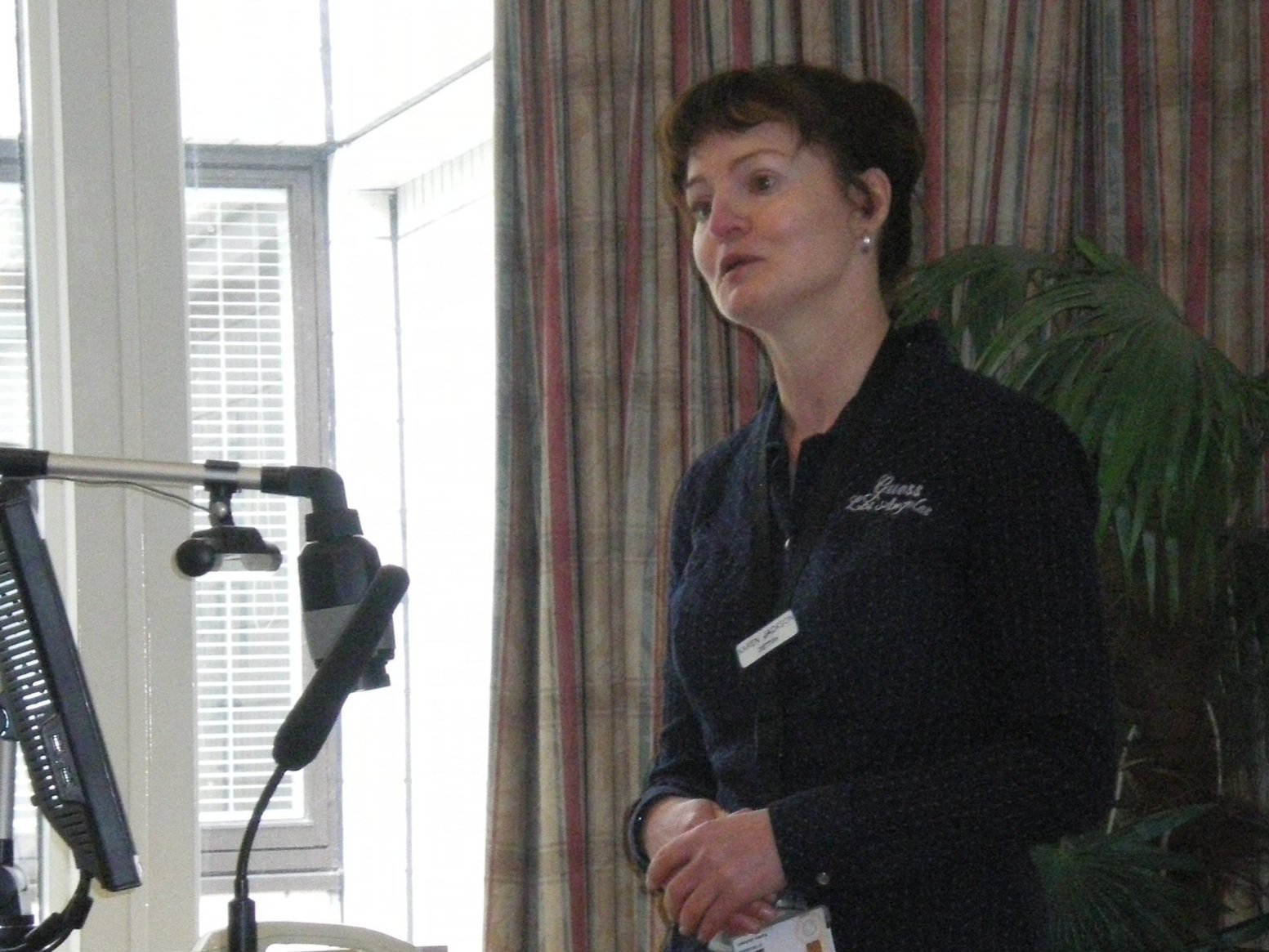
Information Day 2014
10:00 Coffee on arrival
10:30 Welcome & domestics
10: 40 Introduction – Bruce George, Kangaroo Club Chairman & Colorectal Surgeon Oxford University Hospitals (OUH) NHS Trust
Diagnosis of Ulcerative Colitis (UC) and Crohn’s Disease (CD)
A major problem remains the difficulty of differentiating the diagnoses of UC and CD. UC affects only the large bowel and only the mucosa, whereas CD affects the whole gastrointestinal tract and all layers of it. The fact that CD can mimic UC presents challenges for surgeons during pre-pouch work-up.
The Cleveland Clinic (USA) is one of the biggest centres in the world for pouches, having done over 3,000. A recent survey found that 204 pouches had been made for CD patients: of these 20 were done intentionally (where there was no evidence of peri-anal or small bowel CD), 97 were diagnosed immediately on colon pathology and 87 were diagnosed after a delay. There remains, therefore, a need to minimise the surprise finding of CD in pouch patients. One way forward is, if in doubt, to remove the colon first and then do a three-stage operation (which is not the practice in Cleveland).
Poor Pouch Function
For pouchitis, Ciprofloxacin is the best antibiotic. The probiotic VSL#3 would seem to have long term benefits (better than placebo), especially after antibiotics.
It must be noted, however, that there are other causes of poor pouch function than pouchitis – and full assessment of pouch function is therefore needed. (Practitioners need to continue to look inside, above, and below, as well as outside the box!) Treatment must be dependent upon identification of the cause of poor pouch function.
A study made by the University Hospital Leuven (Belgium), which is one of the biggest centres, found that the anti-inflammatory, anti-TNF drugs, infliximab (IFX) and adalimumab (ADA) led to improvement in 88% of patients, whether of UC or CD.
There are also surgical options for failing pouches; indefinite diversion (with pouch excision or with pouch left in-situ), pouch reconstruction (which is rare, because problematic), or the formation of a Koch Pouch.
The Future
Significant advances are being made in keyhole surgery, which causes far less scarring and fewer adhesions. This could increasingly be robotic assisted, a technique already being used at Aarhus University Hospital (Denmark).
The full presentation can be downloaded by clicking here
11:20 A Discussion about Diet – Karen Jackson, Dietitian RD, BSc Hons, Sports Nutrition Specialist PG Cert, OUH NHS Trust
The Ileo-Anal Pouch and Diet
Introduction
Function of the colon:
absorption of electrolytes e.g. salt
re-absorption of water (although 90% of this is absorbed in the ileum)
formation of stool
fermentation
synthesis of vitamins
Compensation for these functional losses in all post-colectomy patients is complex. The verdict must be that experiment is necessary to determine individual tolerance – and this is especially the case with fruit and vegetables. Soluble fibre, found, for instance, in the soft flesh of a peach, helps the bowel to absorb water.
Dietary Recommendations
Protein: 1.5 ounces per day, as more is just excreted in urine.
Milk and dairy products: these provide the most abundant supply of the most ‘at risk’ nutrient, especially in CD, but they can also have an impact on pouch output, so it may be best to keep to small amounts.
Fluid Intake: 8-10 cups per day. High output leads to loss of water, salt and potassium. Tea and coffee can encourage dehydration, so should be limited to 4 cups per day.
Special Considerations
Particular thought should be given to the following:
calcium
vitamins and minerals
hydration
energy (calories) – either too much or too little, depending on the individual
Pouch Dysfunction
Dietary contributory factors could be:
alcohol
fat
sorbitol
Probiotics
There is no overall consensus on the efficacy of these. Some research has been based on small samples and of poor quality. There is some small evidence that high dose probiotics have led to patients with chronic pouchitis remaining in remission. They may be particularly useful after antibiotics, which wipe out all (good and bad) bugs. They may vary in efficacy. As ever, the need to experiment is paramount. Over-the-counter yoghurts etc are probably less efficacious: the question with these is, when the yoghurt gets to the supermarket, are the bacteria still alive?
Foods with Adverse Effects
Again, individual pouch owners report very different experiences, so experimentation is paramount. The following is a rough guide:
Foods which increase wind and odour:
broccoli, cabbage
onion, garlic
beans
spicy foods
carbonated drinks, beer
eggs
Foods which increase output:
pulses and leafy vegetables
high fibre foods
Conclusion
Individual experiences vary tremendously, so it is necessary to experiment. If there are particular problems, a formal assessment from a specialist dietician may be needed.
The full presentation can be downloaded by clicking here
12:00 AGM and Kangaroo Club Update
12:30 Lunch
13:20 Nurse-Led Clinics – Simon Turley, Colorectal Nursing OUH NHS Trust
The clinics were established in 2003 by Angie Perrin and were the first of their kind in the UK. Slots are 30 minutes each, so there is plenty of time for investigation and discussion. If a patient has not been seen for 3 years, or comes from outside, a GP referral back into the system is required.
Further information is now available in electronic form.
The following blood tests are recommended:
FBC
U&Es
LFTs
Vit B12
Ferritin
The full presentation can be downloaded by clicking here
13:30 The Koch Pouch – Fran Woodhouse, Colorectal Nursing OUH NHS Trust
The Continent Ileostomy, or Koch Pouch was first introduced in 1969. It was largely superseded by the Ileo-Anal Pouch, introduced by AG Parks and RT Nicholls in 1978. The K pouch started being performed again in 2007 at the Oxford Radcliffe Hospitals NHS Trust due to patient demand. Professor Neil Mortensen is currently the primary practitioner.
The Koch Pouch can be an option after failure of an Ileo-Anal Pouch – but it is not without problems of its own. The biggest difficulty is of valve slippage, which can lead to the need for an ileostomy bag. This is most common in the first 3 months after the operation and can require a further operation to correct it.
The full presentation can be downloaded by clicking here
14:00 Pouch Function and Dysfunction – Dr Simon Travis DPhil FRCP, Gastroenterologist OUH NHS Trust and Linacre College
Normal Pouch Function
This can be defined as:
6-8 bowel movements per 24 hours
1-2 per night
loose or semi-formed stools
able to defer for 1 hour
occasional seepage at night
function stabilises 1 year after surgery
Pouchitis
Pouchitis affects 30% of patients.
Risk factors include:
extensive UC
Primary Sclerosing Cholangitis (PSC) – a bile duct disorder
being a non-smoker
auto-immune cytology of perinuclear anti-neutrophil cytoplasmic antibodies (pANCA)
Pouchitis would appear to be driven by bacteria.
Diagnosis
There are 3 ways of diagnosing pouchitis; observation of symptoms, endoscopy or histology. The Cleveland Clinic (USA) only followed up patients by telephone and therefore could only use the first method. Consequently they ‘found’ a much higher occurrence of pouchitis in their patients.
There has been a miserably small amount of real research. One survey, for instance, numbered only 20 patients. The probiotic VSL#3, which contains 8 different bacteria, has been found to be effective by Claudio De Simone, at the University of Bologna, but unfortunately it would seem to work better in Bologna than it does in other parts of the world.
The solution is most likely to be complex.
Caveat – Centres of Excellence
78% of hospitals in the UK now offer pouch surgery: the median number of procedures in a year they do is 1. The back-up of an interdisciplinary team is necessary.
Pouches and Pregnancy
The problem of sphincter weakness is the reason why pregnant women with pouchitis or pregnant women with UC who are thinking of pouch surgery are recommended by the Oxford Radcliffe Hospitals NHS Trust to have an elective caesarian section. The view is that it is imperative to protect the sphincter muscle. It must be conceded however that many people with pouches have normal births elsewhere.
Other Diseases
The difficulty of differentiating between UC and CD remains. It could be said that there is nothing like a pouch for bringing out CD in patients.
Cancer, however, is stunningly rare in pouchees. Not a single example of cancer in a pouch has been found where there were no early signs of cancer in the colectomy specimen.
14:40 Break
14:45 Discussion Groups:
Pouchitis
Sport and an Active Life
Longevity –pouches over time
15:15 Questions and Answers – Simon Turley & Fran Woodhouse Colorectal Nursing OUH NHS Trust
Q: What is the cause of itchy skin?
A: This is probably the result of lack of absorption of fatty acids. The advice is to put olive oil on the skin.
Q: Is the medical world yet on common ground on the cause of UC?
A: Oh yes –everyone agrees that we don’t know what it is! It is probably 40% genetic – and attributable to bugs in the gut. There is probably not a single cause. Stress may be a factor: stress could lead to colitis, which could lead to more stress, which could lead to ongoing colitis.
Q: Is there any new information on the longevity of pouches?
A: Questions are ongoing. Keep asking for second opinions. Keep in touch with the Kangaroo Club.
Q: What Barrier creams/wipes are available?
A: Barrier creams/wipes available are as follows:
Coloplast comfeel
Drapolene (baby cream) – over the counter
Bepanthen (baby cream)- over the counter
Vaseline
Prescription creams- Clinimed LBF/ Pelican protect
Barrier wipes- Ostomart Ostoguard/ Salts Periprep/Opus Skin safe
Q: What is the correct positioning to enable the most effective emptying of a pouch?
A: The best things to do to enable effective emptying of your pouch are:
Relax
Sit with a slight pelvic tilt
Elevate your feet on a pile of magazines or equivalent- the Oxford English Dictionary!
Q: Does going to the gym especially for stomach exercises help reduce leakage?
A: The best way to reduce leakage is through:
male and female pelvic floor exercises-
Maintaining a “strong abominal box”
Keeping a healthy BMI
15:45 End
There was plenty of opportunity to meet and chat with (other) pouch owners and their partners during the day.

Simon Turley, Colorectal Nursing OUH NHS Trust

Simon Turley & Fran Woodhouse Colorectal Nursing OUH NHS Trust

Karen Jackson, Dietitian RD, BSc Hons, Sports Nutrition Specialist PG Cert, OUH NHS Trust

Bruce George, Kangaroo Club Chairman & Colorectal Surgeon Oxford University Hospitals (OUH) NHS Trust

Fran Woodhouse, Colorectal Nursing OUH NHS Trust

Dr Simon Travis DPhil FRCP, Gastroenterologist OUH NHS Trust and Linacre College
